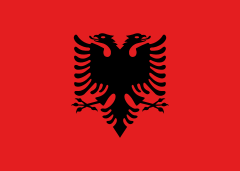
Hoti (tribe)
Hoti is a Northern Albanian tribe and a historical tribal region of Malësia, located in northern Albania and southern Montenegro.
History
Middle Ages
The earliest known historical reference to the Hoti tribe was recorded in 1330, while in 1474 their region was mentioned in Latin sources as montanea ottanorum (English: Mountain of the Hotis).
Before 1421, much of what is today known as "Malësia" was incorporated into the Lordship of Zeta ruled by the powerful Balšić family. According to the local oral history, in 1412-13, the Hoti tribe was engaged in a major dispute over the possession of grazing lands with the neighboring Mataguži tribe. Balša III was called to mediate the dispute. When he decided in favour of the Mataguži, the Hoti tribe attacked the Mataguži and took over the disputed areas. Shortly thereafter, a Mataguži counter-attack claimed the lives of four Hoti clansmen. After a long history of conflict with both the Ottomans and their (sometime) Venetian allies, the Balšići went extinct in 1421, after which the area came under control of Stefan Crnojević who fixed his capital at Žabljak on the north-eastern side of Lake Scutari and joined with his relative, the famous Scanderbeg, in many campaigns against the Turks.

List of Albanians
This is a list of historical and living Albanians (ethnic Albanian people or people of full or partial Albanian ancestry) who are famous or notable, sorted by occupation and name.
Arts
Literature
Writers
A–G
H–L

Albanians
Albanians (Albanian: Shqiptarët) are defined as an ethnic group native to Albania and neighboring countries. The term is also used sometimes to refer to the citizens of the Republic of Albania. Ethnic Albanians speak the Albanian language and more than half of ethnic Albanians live in Albania and Kosovo. A large Albanian population lives in the Republic of Macedonia, with smaller Albanian populations located in Serbia and Montenegro. Albanians produced many prominent figures such as Skanderbeg, leader of the medieval Albanian resistance to the Ottoman conquest and others during the Albanian National Awakening seeking self-determination. Following the Ottoman conquest of the Balkans in the 15th century, the majority of Albanians converted to Islam. Muslim Albanians occupied many important positions in the Ottoman Empire, and were the main pillars of Ottoman Porte's policy in the Balkans. Albania gained its independence in 1912 and between 1945-1992, Albanians lived under a repressive communist regime. Albanians within Yugoslavia underwent periods of discrimination and eventual self-determination that concluded with the breakup of that state in the early 1990s culminating with Albanians living in new countries and Kosovo. Outside the southwestern Balkans of where Albanians have traditionally been located, Albanian populations through the course of history have formed new communities contributing to the cultural, economic, social and political life of their host populations and countries while also at times assimilating too.
Podcasts:

